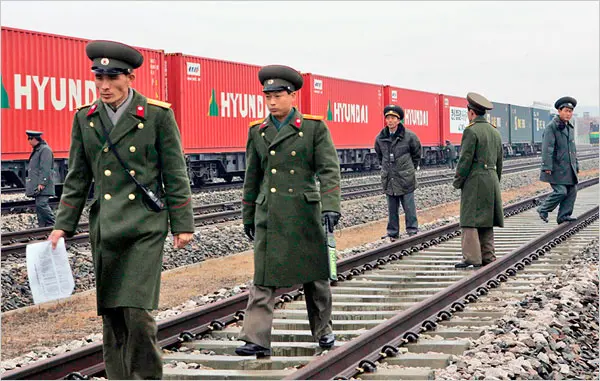Surge in Rail Activity Sparks Concerns Over DPRK-Russia Military Cooperation
October 8, 2023 In the wake of the recent Kim-Putin summit, there's been a significant uptick in rail traffic between North Korea and Russia, triggering international concerns. Satellite imagery from October 5, 2023, displays an unprecedented number of freight railcars, approximately 73, at North Korea's Tumangang

October 8, 2023
In the wake of the recent Kim-Putin summit, there's been a significant uptick in rail traffic between North Korea and Russia, triggering international concerns. Satellite imagery from October 5, 2023, displays an unprecedented number of freight railcars, approximately 73, at North Korea's Tumangang Rail Facility located near the Russian border. This traffic surge greatly surpasses any observed activity at the facility over the past five years, even compared to pre-Covid-19 levels.
During Kim Jong-un's visit to Russia from September 12 to 17, he engaged in discussions with President Putin, which included military exchanges and cooperation. Their dialogue involved potential arms for food and energy trades, with Kim’s itinerary hinting at possible Russian support in satellite and space-launched vehicle technology for North Korea, potentially encompassing ICBM technology.
This steep rise in rail traffic comes amid the U.S. government's announcement that North Korea has begun transferring artillery to Russia, presumably to aid Russia in its ongoing conflict with Ukraine. Furthermore, recent high-resolution satellite imagery reveals around 73 railcars, a significant jump from the maximum of 20 railcars spotted over the last half-decade. The nature of the freight remains a mystery, as shipping containers and equipment are veiled with tarps, although some speculate it includes arms and munitions.
In contrast to the bustling activity at Tumangang, Russia’s Khasan Rail Facility shows a more subdued rail activity level. But with North Korea's ambitious construction projects at the Tumangang facility, including a potential new warehouse and a reinforced security wall with guard positions, the intent appears clear: North Korea is preparing for more than just the resumption of pre-Covid-19 border traffic. They are expanding the facility's capacity, possibly hinting at a more robust and long-term cooperation between DPRK and Russia.
However, these potential military exchanges could breach multiple UN Security Council resolutions, making North Korea susceptible to additional sanctions from the U.S. and its allies. The U.S. State Department's spokesperson, Matthew Miller, voiced concerns, stating that the U.S. "will not hesitate to impose sanctions if and when it's appropriate."
As the situation unfolds, the international community is closely monitoring these developments, speculating about the nature of DPRK-Russia cooperation and its potential implications for global peace and security.




